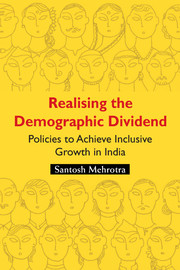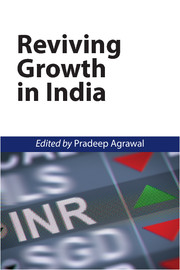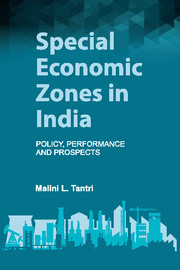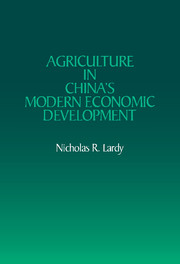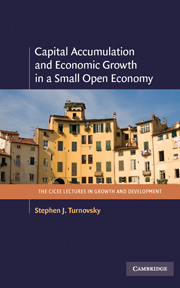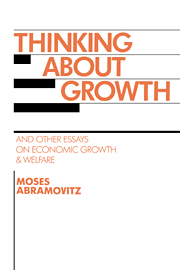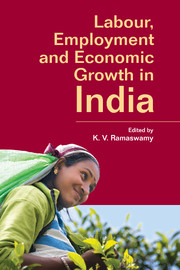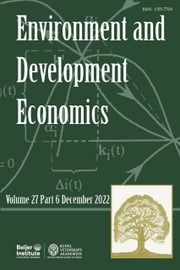Realising the Demographic Dividend
Policies to Achieve Inclusive Growth in India
- Author: Santosh Mehrotra, Jawaharlal Nehru University
- Date Published: No date available
- availability: Temporarily unavailable - available from TBC
- format: Paperback
- isbn: 9781108442336
Paperback
Other available formats:
Hardback, eBook
Looking for an inspection copy?
This title is not currently available for inspection. However, if you are interested in the title for your course we can consider offering an inspection copy. To register your interest please contact [email protected] providing details of the course you are teaching.
-
This book discusses policies to achieve inclusive growth in India and realise the demographic dividend, which will end by 2040 when India will become an aging society. India is the world's fastest growing large economy, but jobs are not growing equally rapidly. The size of India's youth workforce is worrying, and the largely informal workforce is not covered by social insurance. Universal elementary education, despite the Right to Education Act 2009, is yet to be achieved. Health outcomes have improved only slowly over the years. Furthermore, sanitation still remains a very serious problem. As an economist and former policy-maker, the author discusses specific policies to address these problems, well beyond what is currently being practised. The book also deals with the governance issues that need to be addressed before inclusive growth can be attained.
Read more- Discusses the key features of inclusiveness in the economic growth process
- Elaborates on specific policies in education, nutrition, sanitation and health to enhance the human capital of India's workforce
- Lays out specific policies dealing with the poor, social insurance and cash transfers
Reviews & endorsements
'This is a topic of fundamental importance to the future development path of India. The script is exceptionally clearly structured and sharply written. This is a topical issue about which an increasing number of people are writing. However, the level of analysis in this volume is far above other analyses of this complex topic. This book is likely to be widely referred to and become a standard reference for debates about India's labour market and employment policies, and their relationship to growth and social justice in India.' Peter Nolan, Director of Development Economics, University of Cambridge
See more reviews'India is at the mid-point of its demographic dividend, a half-century window of low dependency ratios before the effects of an ageing population kick in. India's remarkable growth in the last quarter century has not been as effective in poverty reduction as it could have been; the employment intensity of growth has been low and volatile, and women's labor force participation is on the decline despite growth in per capita income. This excellent book combines analytical sharpness and policy sensitivity to tackle the central issue of how to make best use of the demographic dividend for inclusive development. It will be of interest to analysts and policy makers alike.' Ravi Kanbur, T. H. Lee Professor of World Affairs and International Professor of Applied Economics and Management, Cornell University
'Mehrotra addresses each welfare dimension with crisp histories of programmes that were introduced for each area. Diagnosis flows naturally from these two elements and translates effectively into practical policy recommendations. This book will become a standard reference for anyone wanting to understand why things are the way they are in India's welfare state and what must be done about it.' Subir Gokarn, Former Governor, Reserve Bank of India and Director, Brookings India
'It is a highly topical subject: why did India fail to translate its fast growth into welfare for the poor? This is a thoroughly professional piece of work by a through and through professional. The book is basically empirical, although it has a theoretical foundation in the work of Amartya Sen and Martha Nussbaum.' Ajit Singh, Professor Emeritus in Economics, University of Cambridge
'… a magnificent book. Readers will be delighted with his empirically rich, sharp evidence-based analysis of India's development and his fine scrutiny of the country's strategic errors in its social and economic policy.' Flavio Comim, Journal of Human Development and Capabilities
Customer reviews
Not yet reviewed
Be the first to review
Review was not posted due to profanity
×Product details
- format: Paperback
- isbn: 9781108442336
- availability: Temporarily unavailable - available from TBC
Table of Contents
List of tables and figures
Preface
Acknowledgements
Part I. Growth, Employment and Inclusion:
1. Capability-centred approach to inclusive growth: theoretical framework and empirical reality
2. Sustaining economic growth
3. Ensuring higher agricultural growth and the revival of rural India
4. Addressing the employment-related paradoxes of economic growth
5. Public finance: increasing fiscal capacity
6. Skill development: finding new financing mechanisms to take vocational education and training to scale
7. A common platform for skill development: implementing the national skills qualification framework
Part II. Human Capital Formation:
8. Addressing capability deprivation of women for inclusive growth
9. From the right to education to the right to learning
10. Food security, nutrition and health: policy dilemmas and interlinked challenges
11. Redesigning sanitation programmes to make India free from open defaecation
Part III. Building a System of Social Protection:
12. Minimising leakages in welfare programmes: how to identify the poor correctly?
13. Needed a social insurance system for unorganised workers below the poverty line
14. Introducing cash transfers: a proposal for a minimum income guarantee and some CCTs
Part IV. Governance:
15. Two pre-requisites for optimum governance: deep fiscal decentralisation and the bureaucracy's ability to learn
16. Addressing left-wing extremism: encourage peace to secure development – or the other way around?
Index.
Interview with Dr. Santosh Mehrotra on Realising the Demographic Dividend
Sorry, this resource is locked
Please register or sign in to request access. If you are having problems accessing these resources please email [email protected]
Register Sign in» Proceed
You are now leaving the Cambridge University Press website. Your eBook purchase and download will be completed by our partner www.ebooks.com. Please see the permission section of the www.ebooks.com catalogue page for details of the print & copy limits on our eBooks.
Continue ×Are you sure you want to delete your account?
This cannot be undone.
Thank you for your feedback which will help us improve our service.
If you requested a response, we will make sure to get back to you shortly.
×
